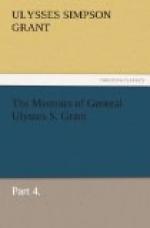The enemy was surprised by the movements which secured to us a line of supplies. He appreciated its importance, and hastened to try to recover the line from us. His strength on Lookout Mountain was not equal to Hooker’s command in the valley below. From Missionary Ridge he had to march twice the distance we had from Chattanooga, in order to reach Lookout Valley; but on the night of the 28th and 29th an attack was made on Geary at Wauhatchie by Longstreet’s corps. When the battle commenced, Hooker ordered Howard up from Brown’s Ferry. He had three miles to march to reach Geary. On his way he was fired upon by rebel troops from a foot-hill to the left of the road and from which the road was commanded. Howard turned to the left, charged up the hill and captured it before the enemy had time to intrench, taking many prisoners. Leaving sufficient men to hold this height, he pushed on to reinforce Geary. Before he got up, Geary had been engaged for about three hours against a vastly superior force. The night was so dark that the men could not distinguish one from another except by the light of the flashes of their muskets. In the darkness and uproar Hooker’s teamsters became frightened and deserted their teams. The mules also became frightened, and breaking loose from their fastenings stampeded directly towards the enemy. The latter, no doubt, took this for a charge, and stampeded in turn. By four o’clock in the morning the battle had entirely ceased, and our “cracker line” was never afterward disturbed.
In securing possession of Lookout Valley, Smith lost one man killed and four or five wounded. The enemy lost most of his pickets at the ferry, captured. In the night engagement of the 28th-9th Hooker lost 416 killed and wounded. I never knew the loss of the enemy, but our troops buried over one hundred and fifty of his dead and captured more than a hundred.
After we had secured the opening of a line over which to bring our supplies to the army, I made a personal inspection to see the situation of the pickets of the two armies. As I have stated, Chattanooga Creek comes down the centre of the valley to within a mile or such a matter of the town of Chattanooga, then bears off westerly, then north-westerly, and enters the Tennessee River at the foot of Lookout Mountain. This creek, from its mouth up to where it bears off west, lay between the two lines of pickets, and the guards of both armies drew their water from the same stream. As I would be under short-range fire and in an open country, I took nobody with me, except, I believe, a bugler, who stayed some distance to the rear. I rode from our right around to our left. When I came to the camp of the picket guard of our side, I heard the call, “Turn out the guard for the commanding general.” I replied, “Never mind the guard,” and they were dismissed and went back to their tents. Just back of these, and about equally distant from the creek, were the guards of the Confederate pickets. The sentinel on their post called out in like manner, “Turn out the guard for the commanding general,” and, I believe, added, “General Grant.” Their line in a moment front-faced to the north, facing me, and gave a salute, which I returned.




